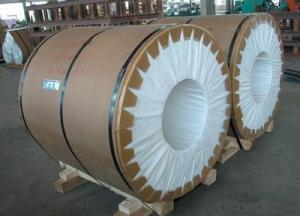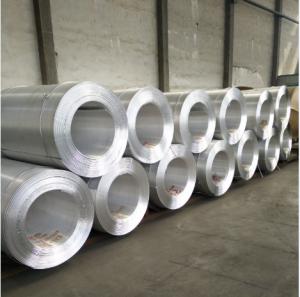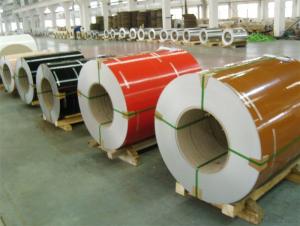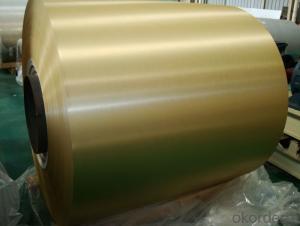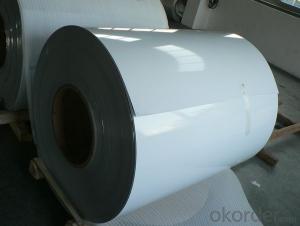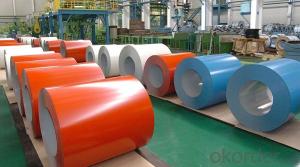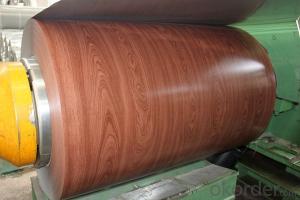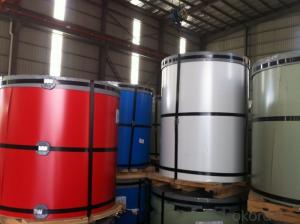Coil Coated Aluminum Color Coated Aluminium Coils for Metal Wall ACP
- Loading Port:
- Shanghai
- Payment Terms:
- TT OR LC
- Min Order Qty:
- 5 m.t.
- Supply Capability:
- 10000 m.t./month
OKorder Service Pledge
OKorder Financial Service
You Might Also Like
Specification
1. Structure of Color Coated Aluminium Coils for Metal Wall ACP Description
• Product: Aluminim coils
• Application:
corrugated roofs, outer walls, ovens, electrically controlled cabinets.
household appliances, transportation, base plate, color coating.
industrial freezers in the residential and industrial buildings.
refrigerator backplane, gas stove, air conditioner, microwave, LCD border.
• Advantage: Full production line with all kinds of coils supply
2. Main Features of the Color Coated Aluminium Coils for Metal Wall ACP
• Our goods quality is top, the surface is smooth, and every steel coil
• No Joint, No Bends, no spots, no roller marks.
• MTC will be provided with goods, third part inspection is acceptable, for example, SGS, BV. Etc
3. Color Coated Aluminium Coils for Metal Wall ACP Images
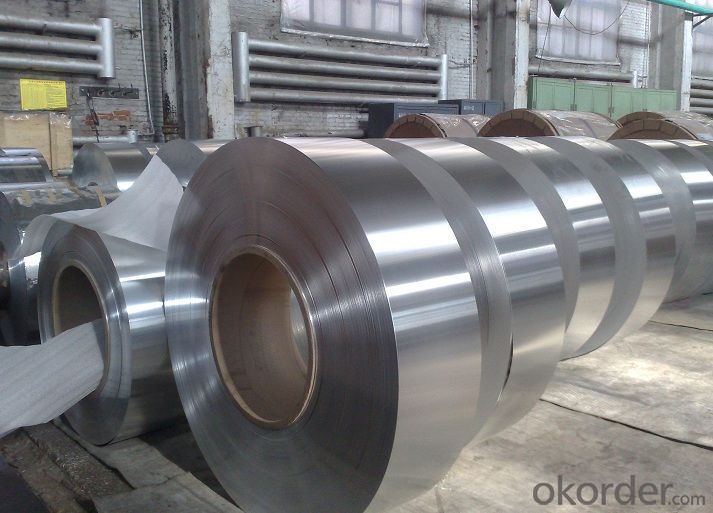
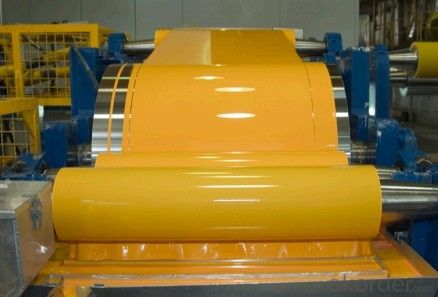
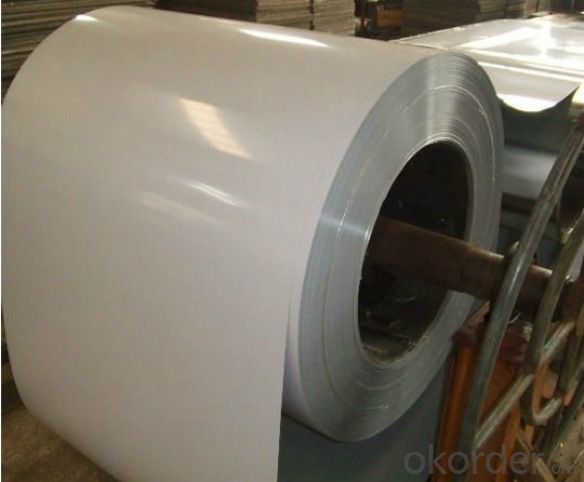
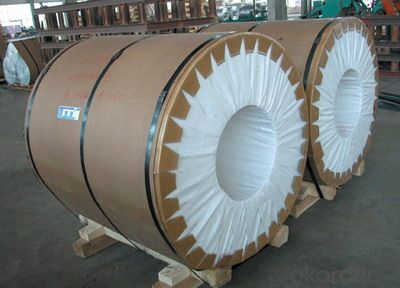
4. Color Coated Aluminium Coils for Metal Wall ACP Specification
Alloy | AA1050/1100/3003/3005/3105/5005/5052 etc |
Thickness | 0.03mm—4.0mm |
Width | 10mm—1600mm |
Coating | PVDF, PE |
Coatingthickness | Usually16-25 micron, could be 33-40 micron |
Color | According to Ral |
Standard | ASTM-B 209 GB/3008-2006 |
Usage/ApplicationsCoated Aluminum Coil/Sheet | Constructionand decoration, electronic appliances, lighting decoration, air-condition airpipe, sandwich panels and drainage, etc |
5.FAQ of Color Coated Aluminium Coils for Metal Wall ACP
We have organized several common questions for our clients,may help you sincerely:
① How about your company?
A world class manufacturer & supplier of aluminum coil and alloy blanks. Aluminum production base is comprised of 18 aluminum annealers, 10 coil and foil mills, 4 continuous production lines, 2 hot rolling production line and 3 prepainted lines.
Export 5000 tons per month to Asia, America and Middle East. Always do the best for our clients.
②Can you guarantee the quality of the products?
We are responsible for the quality of materials to get a long-term cooperation with clients in a reasonable period of time and we are glad to arrange and coordinate any third party inspection for you.
③What is the delivery time after purchase?
35 day after receiving client’s deposit or correct LC
- Q: How are aluminum coils tested for dimensional accuracy?
- Aluminum coils are tested for dimensional accuracy through various methods to ensure that they meet the required specifications. One common method is the use of specialized equipment such as calipers, micrometers, and digital measuring devices. These tools are used to measure the dimensions of the coils, including their width, thickness, and length, with high precision. During the testing process, a sample coil is selected and measured at different points along its length to check for any variations or deviations from the specified dimensions. This helps to identify any potential issues with the coil's dimensional accuracy. In addition to manual measurements, advanced technologies such as laser scanning systems and optical sensors are also utilized. These technologies provide non-contact measurements, allowing for faster and more accurate assessments of the coil's dimensions. Laser scanners create a digital representation of the coil's surface, which can be compared to the desired specifications to determine if any deviations exist. Furthermore, computerized systems are employed to analyze the collected data and generate detailed reports. These reports provide comprehensive information regarding the coil's dimensional accuracy, highlighting any discrepancies from the required standards. This data analysis enables manufacturers to identify and address any potential problems promptly. Overall, aluminum coils undergo stringent testing procedures to ensure their dimensional accuracy. The combination of manual measurements, advanced technologies, and computerized analysis provides a thorough assessment of the coils' dimensions, allowing manufacturers to maintain high-quality standards and deliver products that meet the precise specifications demanded by various industries.
- Q: Can aluminum coils be used in food processing applications?
- Yes, aluminum coils can be used in food processing applications. Aluminum is a highly versatile and commonly used material in the food industry because of its numerous benefits. Aluminum coils are lightweight, durable, and have excellent thermal conductivity, making them ideal for applications that require even and efficient heat transfer. In food processing, aluminum coils are often used in equipment such as heat exchangers, evaporators, and refrigeration units. They are used to cool, heat, or maintain the temperature of various food products during processing, storage, or transportation. The excellent thermal conductivity of aluminum ensures that heat is evenly distributed, helping to preserve the quality and taste of the food. Additionally, aluminum is a non-toxic and non-reactive metal, which means it does not affect the flavor or composition of the food being processed. It also has a natural resistance to corrosion, ensuring that the coils do not contaminate the food and are easy to clean and maintain. Furthermore, aluminum is a sustainable and recyclable material, aligning with the growing demand for environmentally friendly practices in the food industry. Its lightweight nature also contributes to energy efficiency and reduced transportation costs. Overall, aluminum coils are a safe, efficient, and reliable choice for food processing applications, meeting the stringent requirements of the industry while maintaining the quality and safety of the processed food.
- Q: Is it possible to recycle aluminum coils?
- <p>Yes, aluminum coil can be recycled. Recycling aluminum is a highly efficient and environmentally friendly process. It requires only 5% of the energy needed to produce new aluminum from raw materials. Recycled aluminum coils can be used to manufacture new aluminum products, reducing waste and conserving resources. The recycling process typically involves melting the aluminum, which can then be reshaped into new coils or other forms. This makes aluminum one of the most recycled materials in the world.</p>
- Q: What are the thickness tolerances for aluminum coils?
- The thickness tolerances for aluminum coils can vary depending on the specific grade and alloy of aluminum being used. Generally, the tolerance range for aluminum coil thickness is within +/- 0.003 to 0.015 inches (0.076 to 0.381 mm). However, it is important to note that different industries and applications may have their own specific requirements and tolerances. It is recommended to consult the relevant industry standards or specifications to determine the precise thickness tolerances needed for a particular application.
- Q: What is the hardness of aluminum coils?
- The hardness of aluminum coils is subject to change due to several factors, including the particular alloy employed and the applied tempering process. Typically, in comparison to other metals, aluminum coils exhibit relatively low hardness. Aluminum is esteemed for its lightweight and pliable characteristics, rendering it effortlessly bendable and moldable. Nevertheless, by subjecting aluminum coils to diverse heat treatment methods like annealing or cold working, their hardness can be augmented to fulfill specific criteria. It should be emphasized that the hardness of aluminum coils can also fluctuate depending on the intended purpose and the desired degree of robustness and endurance.
- Q: What influence do aluminum coils have on the welding process?
- <p>Aluminum coils can significantly affect welding work due to their unique properties. Aluminum has a high thermal conductivity, which requires more heat input to achieve the necessary temperature for welding. It also has a high oxide layer that can interfere with the welding process, leading to porosity and poor joint strength if not properly managed. Additionally, aluminum's low melting point can cause challenges in maintaining the correct temperature during welding. Specialized techniques, such as TIG (Tungsten Inert Gas) welding, and the use of appropriate filler materials are often necessary to ensure a successful weld. Proper cleaning and preparation of the aluminum surface are also crucial to prevent contamination and ensure a strong, defect-free weld.</p>
- Q: How are aluminum coils used in the production of aircraft components?
- Aluminum coils play a crucial role in the production of aircraft components. These coils are typically made from high-quality aluminum alloys that offer a combination of strength, durability, and lightness, making them ideal for aircraft manufacturing. One primary use of aluminum coils in aircraft production is in the fabrication of sheet metal parts. These coils are processed through various techniques such as rolling, stretching, and bending to form flat sheets of aluminum. These sheets are then cut and shaped to create various aircraft components, including wings, fuselage panels, and tail surfaces. The lightweight nature of aluminum makes it a preferred material for aircraft construction as it helps reduce the overall weight of the aircraft, enhancing fuel efficiency and performance. By using aluminum coils, manufacturers can easily produce thin and lightweight parts, which contribute to the aircraft's overall weight reduction. Moreover, aluminum coils are also used in the production of structural components such as frames and beams. These coils are formed into extrusions, which are then cut and joined to create structural elements of the aircraft. Aluminum's high strength-to-weight ratio makes it an excellent choice for these components, as it provides the required strength while keeping the weight of the aircraft low. In addition to its structural applications, aluminum coils are also used in the production of various aircraft systems. For instance, these coils are utilized in the construction of heat exchangers, air conditioning units, and fuel tanks. The excellent thermal conductivity of aluminum allows for efficient heat transfer, which is crucial for maintaining optimal operating conditions within the aircraft. Overall, aluminum coils are extensively used in the production of aircraft components due to their lightweight, high strength, and excellent thermal properties. Their versatility and ability to be processed into various shapes and sizes make them a preferred material for manufacturing crucial aircraft parts, ensuring the safety, performance, and efficiency of modern aircraft.
- Q: How do aluminum coils contribute to improved building aesthetics?
- Improved building aesthetics can be achieved through the use of aluminum coils in several ways. To begin with, sleek and modern exterior finishes can be created for buildings using aluminum coils. Various finishes, such as brushed, anodized, or painted, can be applied to the coils, providing a wide range of design possibilities. Architects and designers can thus achieve their desired aesthetic vision for the building with the help of this versatility in finishes. Furthermore, aluminum coils offer the advantage of being easily shaped and formed into different profiles, resulting in a unique and customized look for buildings. By bending, cutting, or perforating the coils, intricate patterns or architectural details can be created, enhancing the overall aesthetics of the structure. This flexibility in shaping allows for the creation of visually appealing designs that can make a building stand out. Moreover, aluminum coils possess the qualities of being lightweight yet durable, making them an ideal choice for cladding systems. Using aluminum coils as exterior cladding can give buildings a modern and clean appearance. The lightweight nature of the coils also makes installation easier and more cost-effective, ultimately contributing to improved building aesthetics. Additionally, the use of aluminum coils aligns with sustainable building practices and environmentally friendly designs. Aluminum is a highly recyclable material, and buildings that incorporate aluminum coils can be seen as more visually appealing due to their eco-friendly attributes. This reflects the values of the project and its occupants. In conclusion, aluminum coils contribute to improved building aesthetics through their wide range of finishes, their ability to be shaped and customized, their lightweight and durable nature for cladding, and their promotion of sustainable design practices.
- Q: What are the storage life and shelf life of aluminum coils?
- The storage life and shelf life of aluminum coils can vary depending on various factors such as the type of alloy, coating, and storage conditions. However, in general, properly stored and maintained aluminum coils can have a storage life of several years and a shelf life of up to 12 months or more. It is important to store them in a dry, clean, and well-ventilated area to minimize the risk of corrosion or other damage. Regular inspection and maintenance are also crucial to ensure their longevity.
- Q: Can aluminum coils be recycled multiple times?
- Yes, aluminum coils can be recycled multiple times. Aluminum is a highly recyclable material, and the recycling process does not degrade its quality. This means that aluminum coils can be melted down and reformed into new coils multiple times without any loss in their performance or properties. Recycling aluminum not only helps to conserve natural resources but also saves energy compared to producing new aluminum from raw materials. Therefore, aluminum coils are a sustainable and environmentally friendly choice that can be recycled multiple times.
Send your message to us
Coil Coated Aluminum Color Coated Aluminium Coils for Metal Wall ACP
- Loading Port:
- Shanghai
- Payment Terms:
- TT OR LC
- Min Order Qty:
- 5 m.t.
- Supply Capability:
- 10000 m.t./month
OKorder Service Pledge
OKorder Financial Service
Similar products
Hot products
Hot Searches
Related keywords
